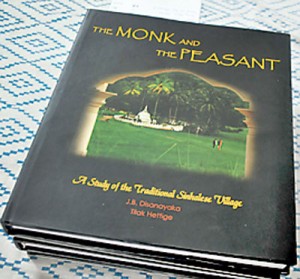Sunday Times 2
Recognising important Buddhist literature
Prof. J B Disanayaka’s book, ‘The Monk and The Peasant’ came under the spotlight at an event held at the YMBA in Borella and graced by many members of the YMBA as well as Buddhist intellectuals. Reviewing the book were the chief incumbent of the Asokaramaya in Kandana, Ven. Polpitimukalane Pannasiri Thera and retired senior public servant and former chairman of the Public Services Commission, Tissa Devendra.
The new project, explained by the president of the Borella YMBA, Suren Abeygoonawardene is to take up important Buddhist literature and to review and discuss it. The project was initiated with the aim of giving recognition to these books as well as to encourage authors and readers of the books.

Pix by Nilan Maligaspe
‘The Monk and The Peasant’ is written by Emeritus Prof. J B Disanayaka who is also the former ambassador of Sri Lanka to Thailand. The book was first published in 1993 and the second edition came out in 2012 as a coffee table book with photographs by Thilak Hettige.
“It was a labour of love,” said Prof. Disanayaka who went on to say that he wrote the book in English to take the quintessence of being a Sri Lankan out in to the world and to retain the essence of our heritage in a digital era. “Our land was always known as a land of scholarship. The monk Fa Hsien came all the way from China through the silk route in early Fifth Century in search of two rare books believed to be lost which he found in Abhayagiri Viharaya,” he said passionately.
The book is a sociological and anthropological study of village life and its bond with the village temple which is one of the two sacred grounds in a village, the other being the Kamatha (paddy field). Prof. Disanayaka chose to focus his book on the monk of the temple and the farmer or peasant of the paddy field.
The book is written in five chapters- the first giving an introduction to the village and introducing village life to the reader; the second introducing the temple which is called “the school without walls” for the education it provides the village children and “the haven of artists” for the murals its decorated with. The third chapter is based on the monk’s life, the rites of passage including the special language used to address matters relating to monks. The fourth chapter is based on the peasant’s life from birth, from the first solid food being consumed, celebrated as Indul Katagema, the first lessons of reading Akuru Kiyaweema all the way to the death of a layman including language associated with the Kamatha. The fifth chapter relates to the values of a village and by extension our country which according to the professor defines our identity of being a Sri Lankan.
Both reviewers praised the author for his hard work, the authentic information provided which evoked nostalgic memories of their own childhood village days and also for his descriptions in the minutest detail. Mr. Devendra commented on the photographs which had perfectly captured snaps of the village lifestyle.
The event came to an end with each speaker reiterating the values that had defined our country for so long. According to Mr. Devendra, the farmer who worked throughout the year loved and respected his herd of buffaloes and treated his cattle as a part of his family because they worked equally hard with him for the harvest. “This is because our nation is known for our nature of appreciation and being magnanimous in giving respect where respect is due.”
Prof. Disanayaka said that in the past the villager was humble enough to wash the feet of visitors to their house. Customs change but in their essence they reflect timeless values.He insisted that the younger generation should be made accustomed to these values such as gratitude, humility, respect for elders and clergy and warm hospitality for which Sri Lankans have been known for worldwide throughout the ages.

